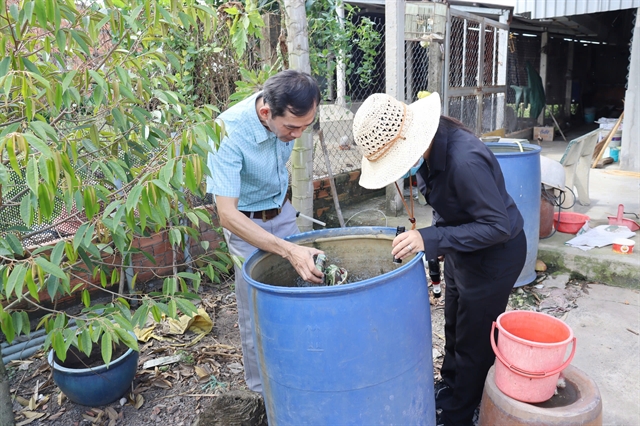 Society
Society


|
| Officials from the Pasteur Institute in HCM City check mosquito larvae at a house in Tây Ninh Province's Đức Lập commune on August 1. Photo courtesy of CDC Tây Ninh |
TÂY NINH — The southern province of Tây Ninh has reported more than 3,900 cases of dengue fever in the first seven months of this year, a 3.7-fold increase compared to the same period last year, according to the provincial Centre for Disease Control.
During the period, the number of severe cases totalled 104 cases, compared to 22 severe cases recorded in the same period last year.
Đức Hoà commune reported 1,152 cases, the highest number, followed by Trảng Bàng commune with 612 cases.
No fatalities have been reported.
As dengue cases are rising in the province, the provincial People’s Committee has ordered the health sector and local authorities to closely monitor the epidemic situation, thoroughly handle outbreaks, strengthen the monitoring system, prepare adequate medicines and medical supplies, and improve treatment capacity to avoid overloading at top-tier hospitals.
Dr. Đặng Anh Tuấn, head of the Department of Infectious Diseases at Long An General Hospital, said that the department is treating both adults and children with dengue fever.
From July until now, the number of hospitalised patients have increased sharply, Tuấn said.
From the beginning of the year to June, the department received an average of four to five dengue cases a day.
However, in July the number of patients increased rapidly.
The rise in dengue fever cases began from the rainy season and is expected to continue to increase in the last months of the year, he said.
He advised people to take preventive measures and seek medical care as soon as symptoms appear to avoid serious complications.
If dengue fever is mild, patients can monitor it at home. However, with severe warning signs, timely hospitalisation is needed for treatment to avoid the risk of severe illness and death, he said.
Dr. Huỳnh Hữu Dũng, director of the provincial Centre for Disease Control, said dengue fever outbreaks often occur in densely populated areas, especially in boarding houses around industrial parks and clusters where rainwater that has stagnated for a long time becomes a place for Aedes mosquitoes to lay eggs, reproduce, and spread the disease.
He warned that it is the rainy season in the southern region and the risk of disease outbreaks will increase in the coming time.
Therefore, it is necessary to have the involvement of not only the health sector but also the authorities and locals in eliminating the breeding grounds of Aedes mosquitoes, monitoring outbreaks, and early detection of cases. — VNS




